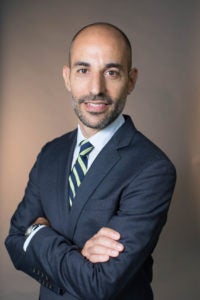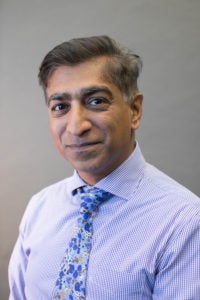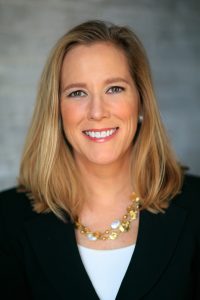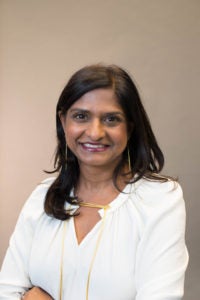Georgetown Law Welcomes Four New Faculty Members
August 27, 2018
Georgetown Law welcomes four new full-time faculty members for 2018-2019 — accomplished scholars in legal history, technology law, intellectual property and business who will enrich our community in numerous ways.
Professor Kevin Arlyck: Living History
When Professor Kevin Arlyck was clerking for Justice Sonia Sotomayor on the Supreme Court in 2010-2011, he obviously worked very long hours — evenings and weekends were the norm. And if her clerks were in chambers on a Saturday, he recalls, Justice Sotomayor would often make mornings a bit better by bringing in bagels for the group. Unfortunately, notes Arlyck — who earned his J.D. and a Ph.D. in history at New York University — they were D.C. bagels, not New York bagels.

Professor Kevin Arlyck.
“It was really one of those situations where it was the thought that counted,” Arlyck jokes. “We knew that she knew that they weren’t really good bagels — she’s a lifelong New Yorker. But she did what she could. It was little gestures like that that showed us that, yes, we were working really hard, and not only was she there with us, but she absolutely appreciated it.”
Arlyck may have to get used to substandard bagels again, as he moves from New York — where he was in private practice — back to D.C. to join the Georgetown Law faculty full time. He’ll teach civil procedure and federal courts, and likely a seminar in legal history. “Based on my background, being able to teach foundational courses on procedure and the courts as well as more specialized classes in legal history is a dream come true,” he says.
Arlyck originally intended to become “just” a historian, but realized when earning his M.A. in historical studies at The New School for Social Research in New York that he was interested in law as well. He completed his J.D. in 2008 and his Ph.D. in 2014 — after his Supreme Court clerkship and while doing a fellowship at Columbia Law School. His dissertation, Forged by War: The Federal Courts and Foreign Affairs in the Age of Revolution, explores the federal courts’ role in early U.S. foreign affairs, and he is presently working on a book on the same subject. He’s also working on a second project about federal law enforcement between the ratification of the Constitution and the Civil War.
While history might repeat itself occasionally, Arlyck is careful not to overamplify analogies. “It’s always possible to find historical analogues to present-day events,” he notes. “I think one of the tensions for a historian lies in properly straddling the line between pointing out historical analogies that might help us think both about the past and the present in new ways, but also paying attention to the way in which past events really were meaningfully different from the present.”
The historian who originally never saw himself practicing law found that he enjoyed it. After law school, he landed a federal clerkship with Sotomayor, then on the Second Circuit. He was all set to start when he received a call from the judge, letting him know that she’d been nominated to the Supreme Court. Arlyck ended up clerking for Judge Robert Katzmann on the Second Circuit initially and then for Sotomayor — on the highest court in the land. “I’d be interested in helping Georgetown students because I had wonderful clerkship experiences,” he says. “I’d love for my students to have similar opportunities when they leave law school.” (Incidentally, both Professor Eloise Pasachoff and Tiffany Wright (L’13) also clerked for Sotomayor on the Supreme Court.)
Besides the prestigious clerkships, Arlyck’s resume includes roles as a French teacher for Teach for America, a Social Studies and English Teacher for the New York City Department of Education and academic fellowships at Columbia and NYU law schools. Before coming to Georgetown Law, he practiced in the Supreme Court and Appellate group at Orrick, Herrington & Sutcliffe in New York. “One of the reasons I’m really excited to be coming to Georgetown is to be able to get back in the classroom,” he says. “Obviously, teaching at a law school will be a different experience than teaching at an elementary or middle school, or teaching undergrads. But I’ve always loved teaching.”
When he’s not working, Arlyck spends time with family, including two young children, aged four and one. Arlyck’s mother is French (and he speaks French at home with his kids), so the whole family celebrated when France won the World Cup this past summer. “My daughter is old enough to have some interest, and fortunately she decided to root for France — that could have gone the other way, depending on what color uniforms the teams were wearing.”
A former competitive runner, Arlyck now jogs just enough to keep body and spirit in working order, but he’s looking forward to exploring the many running routes around Capitol Hill (where he’ll be living) and reacquainting himself with the city more generally. “It’s a dynamic place, and Georgetown is a dynamic institution, so we’re very excited to be here.”
Professor Anupam Chander: Tech Titan
With varied research pursuits in the constantly transforming world of technology, Professor Anupam Chander thrives on conquering the unfamiliar.

Professor Anupam Chander.
“I’ll throw myself at a new project without knowing the landscape at all,” Chander says. “As a generalist lawyer, I feel like I can handle any domain.”
Early on in life, that domain was the computer language BASIC. While growing up in Oxford, Ohio, he’d bike over to the local university with his brother and camp out in the tech lab, teaching himself programming.
“Because there were no computer games in existence, you would just write your own,” he says.
Today he’s writing books and articles on technology governance around the world, global commerce in the digital age, and data privacy and security. He’s taught cyberlaw and a range of international law topics, including international finance, trade and intellectual property.
Chander focuses on technology because today, economic development largely depends on it, he says. So Chander looks at how technology, especially the Internet, can encourage and disrupt an economy.
“There are more people who have mobile phones than access to electricity,” he says. “Focusing on technology, then, seems like a good way to understand how economies develop in the twenty-first century.”
Chander examined these ideas in his 2013 book, The Electronic Silk Road: How the Web Binds the World in Commerce (Yale University Press). He explores how the Internet has transformed and reconceptualized trade. The new ways we consume the news, develop social networks and have access to enormous amounts of information affect economic activity, he says. For instance, the Internet has introduced more price transparency — a farmer now doesn’t have to trust an intermediary to learn what the price is at the market. At the same time, it has disrupted markets — the buyer now has access to a range of other producers.
“The book argued that the Internet was creating an explosion of trade and services,” he says. “Your phone becomes an invisible entry point into global trade.” The book expresses concern with respect to a global race to the bottom, where companies exploit the Internet to avoid what they see as cumbersome local laws.
One key realization for Chander upon writing the book is that how countries approached Internet regulation early on affected where and how Internet companies grew. The United States, he says, focused on the Internet’s ability to open up markets, open up debate and open up new ideas. A lighter regulatory touch resulted in the largest Internet-based companies developing here. Other countries focused on the Internet’s potential dangers, such as increasing copyright infringement or allowing hateful speech and bullies to gain a platform.
“What I tried to say about the Internet is, where the United States approached the Internet with hope, the rest of the world approached it with fear,” he says. “You can take a normative stance on whether or not we did the right thing or the wrong thing, but I think my descriptive story is accurate.”
Chander also made an original discovery in the world of finance, coining a term that’s been widely adopted in the field. Before embarking on an academic career, he worked at Cleary, Gottlieb, Steen, & Hamilton in New York City, focusing on sovereign debt. He noticed a trend of using instruments targeting citizens living overseas as part of their efforts to raise capital in the international markets.
“I called this class of instrument a diaspora bond, and that name has stuck,” he says.
Chander and his wife, Madhavi Sunder — also a Georgetown Law professor — arrive from the West Coast, where they both taught at the University of California, Davis. He’s excited to join a large law school, “where you have more students to impact,” he says.
“The opportunities that students have here is unparalleled,” he says, “and I’m also just in awe of my colleagues at Georgetown, who are leaders in so many domains.”
Chander is teaching contracts in his first year at Georgetown Law, and his first class was to be at 9 a.m. on the first day of the semester — the 1Ls’ very first taste of law school.
“I don’t script my classes, but I’m scripting this one,” he says. “I’ll be the first person that they’ll see. I’m so looking forward to this opportunity to help them become lawyers.”
Professor Hillary Sale: Championing Leadership
Women today comprise about 50 percent of students enrolled in U.S. law schools and about 40 percent of MBA candidates. Yet as women rise through the corporate world, the pipeline narrows dramatically. According to a 2017 survey of Forbes 1000 companies, for example, only 19.8 percent of board seats were held by women.

Professor Hillary Sale.
Georgetown Law Professor Hillary Sale is determined to change those numbers.
After serving as a visiting professor, Sale joins the Georgetown Law faculty full time this year (she is also a faculty member at the McDonough School of Business). A renowned scholar in corporate and securities law — with a particular focus on corporate governance — she teaches women and leadership for law and business students, as well as for corporate and legal firm executives.
“I do think right now there is a deep awareness around gender, and that is prompting a lot of women to think more about what they want to advocate for in their own lives and careers,” Sale says.
Sale finds that instructing others about leadership is extremely valuable in her own life. “I always try to apply what I’m teaching,” she says. “It’s an excellent learning experience, because it’s a constant reminder that it’s harder than one would think.
“Being a good self-advocate, for example, is challenging — and especially challenging when you’re formulating new relationships or in a new environment.”
She comes to the nation’s capital from St. Louis, where she was the Walter D. Coles Professor of Law and Professor of Management at Washington University.
“I’m very excited and grateful for the opportunity to come to an institution like Georgetown,” she says. “I have two amazing co-authors here, Bob Thompson and Don Langevoort — it’s a talented and growing faculty in the business area.”
Following up on the immense popularity of her Fall 2017 Women and Leadership seminar at Georgetown Law, Sale will teach two sections in Spring 2019. A key feature of the seminar is the series of guest speakers, who reinforce the lessons she teaches through business school case studies with their own real-world experience.
Speakers so far have included former Acting Attorney General Sally Yates; Sumara Thompson-King (L’84), general counsel for NASA; U.S. District Court Judge Virginia M. Hernandez Covington (L’80); and Juliette Pryor (L’91, M.S.’91), senior vice president and general counsel of Cox Enterprises.
Pryor’s class included a Harvard Business School case study on Carla Harris, vice chair of Morgan Stanley. “I was tasked with connecting the idea of authentic leadership with the experiences of a woman of color navigating traditional corporate settings,” Pryor says. “I talked about how I thought I needed to fit into the corporate setting, how draining that was and how much of an impediment it was to my actually being more effective in my job. I thought Carla was really courageous…it took me longer to find that level of courage.”
The focus of Yates’s class was the reflected best self exercise, which comes out of the Ross School of Business at Michigan, Sale says.
“The basic premise is that we work best on our challenges when we work from our strengths,” Sale says. “Sally talked about using her strengths as a leader, and she also did a very open Q&A session with the group.”
Sale holds a variety of leadership positions, including the FINRA Board of Governors. She helped to spearhead the nonprofit DirectWomen organization, which works to increase the representation of women lawyers on corporate boards, and chairs its signature Board Institute.
Pryor, a member of this year’s Institute class, has found the nine-month program extremely rewarding. “This experience isn’t about reinventing yourself, it’s about aggregating the skills and experiences you’ve built over the years, and articulating them as transferable skills that add value in the boardroom,” Pryor says.
Looking back, Pryor wishes she had been exposed to Sale’s lessons in leadership while she was a law student. “Twenty-seven years later, my eldest child Adjua is going to be a first-year at Georgetown,” she says. “I’m really excited that Professor Sale will be part of the legal community, giving my daughter the opportunity to receive world-class mentorship.”
Professor Madhavi Sunder: IP Pioneer
It was the most-cited international intellectual property article in a decade and the twentieth-most cited IP article overall during the same span. Professor Madhavi Sunder’s “IP3 ,” which appeared in the Stanford Law Review in 2006, encapsulated an approach to IP law that at the time got labeled “dangerous” at a conference she attended celebrating luminary IP scholars.

Professor Madhavi Sunder.
Her thinking is this: IP law shouldn’t simply be about promoting innovation, efficiency and incentivizing the creation of products, brands and artistic work. IP so pervades culture and human well-being that a wider perspective than the dominant economic model is needed, Sunder says.
“I argue that we need to lift our gaze from those narrow goals,” she says. “Those are important goals, but they’re narrower than the set of impacts that intellectual property has. Intellectual property affects everything from our ability to access essential medicines to the affordability of educational textbooks, and even our right to criticize the dominant cultural stories of our time. In short, intellectual property implicates giant-sized values, from autonomy to equality.”
These concepts are expanded in her 2012 book, From Goods to a Good Life: Intellectual Property and Global Justice (Yale University Press) and permeate her work. Sunder has developed a theory of participatory culture where more and diverse people are engaged in generating what’s valuable and valued. Sunder places specific emphasis on equity, arguing there’s a growing, global demand for recognition and legal protection of contributions from diverse and marginalized innovators, including women, indigenous communities and the poor.
“A lot of my work emphasizes the importance of democratizing participation in culture,” she says. “Who gets to make the culture? Who is recognized for that creativity? Is their work freely appropriated, or is it recognized as the intellectual property of individual creators that can be respected and shared on fair terms?”
Sunder brings her equity lens to more recent developments in IP law, such as design protection — “The Law of Look and Feel” as she describes it in an article with that title she co-authored in 2017.
“Design is zeitgeist. It’s the fashion, the sign of our times,” she says. If design is given legal protection more and more, “do we go back to the world of only elites having access to certain signs that point to their status and taste?”
Sunder also has a forthcoming article in the Michigan Law Review exploring the implications of taking legally protected “imaginary worlds” into the real world. Think real-life Harry Potter Quidditch leagues or Star Wars-themed weddings.
“It’s the ability to become a character in your favorite story that perhaps has the greatest economic value,” she says. An IP holder’s power to limit or shut such experiences down “fundamentally impedes on the ability for humans to imagine, play, discover and develop their own creativity,” she argues.
Sunder’s passion for fairness and meaning extends beyond the academy. While living in Davis, California, she and her husband, Anupam Chander — also now a Georgetown Law professor — led a campaign in 2005 to have a new elementary school named after Fred Korematsu, the Japanese American who courageously waged a legal challenge to mass internment during World War II.
It was the country’s first school to be named after Korematsu. The effort by Chander and Sunder led to a related project: A comic book. “Fred Korematsu: All-American Hero,” tells the story of a Muslim elementary school girl shunned after 9/11 who discovers Korematsu’s saga and what it means to be an American. The Korematsu Institute distributes it to teachers nationwide.
“It was important to tell his story so that people understand one of the most tragic moments in our history,” Sunder says. “I recognized that there was very little literature to talk to kids about race in America.”
Sunder had an inkling early on that a life in the law was for her. She pursued law after realizing many of the feminist writers and thinkers she admired were legal scholars. She was determined to join the legal world and make her own contributions.
“I didn’t want to practice the law as it is,” she says. “I wanted to think about the law as it could be, and what my perspective as a minority woman, and as a South Asian-American woman could bring to our understanding of law, culture, society and the economy.”